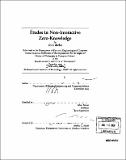Études in non-interactive zero-knowledge
Author(s)
Shelat, Abhi
DownloadFull printable version (3.628Mb)
Other Contributors
Massachusetts Institute of Technology. Dept. of Electrical Engineering and Computer Science.
Advisor
Silvio Micali.
Terms of use
Metadata
Show full item recordAbstract
N a ZERO-KNOWLEDGE PROOF [GMR85], Prover interactively convinces Verifier that theorem 7r is true in such a way that (a) a corrupt Prover cannot convince Verifier of a false theorem and (b) a corrupt Verifier cannot "learn" anything other than the fact that r is true. In a NON-INTERACTIVE ZERO-KNOWLEDGE PROOF [BFM88], the Prover must do the above by sending only a single message to Verifier! To make this possible, Prover and Verifier are not tabula rasa, but rather born with some setup information. Much in the fashion of a musical TUDE, in this thesis, we explore several variations on the setup assumptions for non-interactive zero-knowledge in order to enjoy a richer understanding. Our labor brings forth * various unconditional characterizations of computational and statistical NIZK proofs, * new constructions that have practical applications to non-malleable encryption and CCAz encryption, * new constructions which form the building blocks of "fair" versions of interactive zero-knowledge and collusion-free multi-party computation protocols, * and conceptual contributions which underlie the recent works on how cryptography can be used to achieve equilibrium in game theory.
Description
Thesis (Ph. D.)--Massachusetts Institute of Technology, Dept. of Electrical Engineering and Computer Science, February 2006. Includes bibliographical references (p. 72-76).
Date issued
2006Department
Massachusetts Institute of Technology. Department of Electrical Engineering and Computer SciencePublisher
Massachusetts Institute of Technology
Keywords
Electrical Engineering and Computer Science.